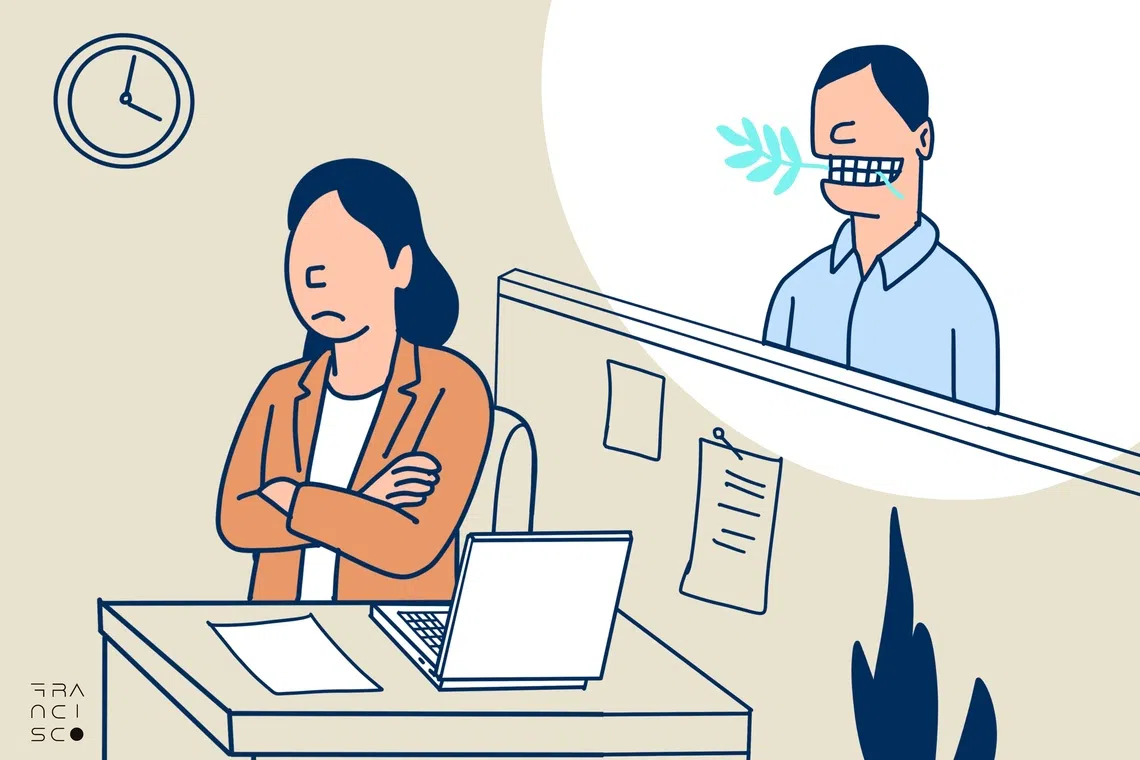askST Jobs: How do you patch things up with a colleague who’s upset?
Sign up now: Get ST's newsletters delivered to your inbox

Repairing a strained working relationship is built through small, consistent gestures of goodwill over time.
ST ILLUSTRATION: MANUEL FRANCISCO
Follow topic:
- Spot early signs of tension, like changes in communication or negative interpretations, an expert suggests.
- Gently address the issue with simple observations and calm conversations to rebuild trust, avoiding direct accusations.
- Consider mediation with consent or professional coexistence if reconciliation proves too difficult or unproductive for well-being.
AI generated
In this series, manpower correspondent Tay Hong Yi offers practical answers to candid questions on navigating workplace challenges and getting ahead in your career. Get more tips by signing up to The Straits Times’ Headstart newsletter.
Q: A colleague seems to be upset with me. What can I do to mend ties?
A: First, learn to quickly spot the signs that something is amiss, especially if a colleague engages with you in a consistently different manner from before.
“You might notice a shift in how they communicate – warmth fades, conversations feel more distant or tense, and politeness starts to feel a little too careful,” says Ms Liew Shi Min, clinical psychologist and director of Heartscape Psychology.
Other subtle shifts could include impatience in facial expressions, as well as a flat, disinterested tone, she says.
“Sometimes, the change lies in how they interpret things. They may begin to assume negative intent – thinking you’re being dismissive or not pulling your weight – even when your behaviour hasn’t changed.
“Neutral comments or actions can start to feel personal to them, often because some tension beneath the surface hasn’t been named.”
The colleague might also be more curt, withhold information from you or reply slower than before, adds Ms Liew.
It can be helpful to approach the colleague to gently broach the topic.
“You might start with a simple observation, like, ‘I noticed we haven’t been talking as much lately’,” Ms Liew suggests.
“Most workplace tensions start from small misunderstandings that were never clarified. Having an open, calm conversation helps to rebuild trust and psychological safety.”
Conversely, asking a colleague directly if he or she is upset can come across as confrontational, making the person feel cornered and defensive.
Organisational psychologist Al Au suggests that those who are unsure whether, and why, they have upset a colleague can seek the views of other colleagues.
Ms Liew says even if your colleague is not ready to engage you right away, a tone of curiosity and care from you often lays the groundwork for a healthier, more trusting working relationship.
Repairing a strained working relationship is rarely about one big conversation or gesture; it is built through small, consistent gestures of goodwill over time, she adds.
“People need to feel understood before they can be open to repair.”
Ms Liew suggests starting with small interactions, such as a simple greeting, sharing space in the pantry or asking a work-related question.
“These moments gradually reintroduce ease and familiarity without forcing a heavy discussion.
“It is also worth reflecting on our own part in the rift. If we recognise something we might have said or done that contributed to the tension, taking ownership and acknowledging it directly shows emotional maturity and accountability,” she says.
However, your colleague also needs to be receptive, which means you need to gauge how much they have responded to your efforts.
Based on research into conflict resolution, raising the issue with bosses signifies that you are opting for arbitration, says Dr Au, a senior lecturer in psychology at the National University of Singapore.
“Arbitration is generally seen as the last resort because you want someone with authority to make a verdict about who is right or wrong in this upset episode.
“While it may be efficient to solve the problem, (arbitration) may not address all the underlying issues such as the colleague’s feelings and emotions.”
Nonetheless, some research has found that employees in East Asian cultures, where authority is respected, prefer arbitration when resolving a work-related dispute, Dr Au notes.
In some cases, seeking help from another colleague – whom you and the seemingly aggrieved colleague trust – to act as an intermediary may be a better idea than going straight to your boss, adds Dr Au.
Ms Liew says the consent of the colleague who appears upset is crucial to making mediation more constructive.
“Otherwise, this could come across as disrespectful or pressurise them into repairing (ties) before they are ready.”
She also encourages team members to consider whether repairing a relationship is truly needed.
“Professional coexistence could also be considered if repairing the relationship takes too much effort and emotional energy, or if this relationship does not take a significant toll on our well-being and work productivity.”
She adds: “If the colleague remains defensive, pushing for reconciliation could backfire. Ultimately, we should also embrace and tolerate the personality differences that occur in many settings.”
Have a question? Send it to askst@sph.com.sg


